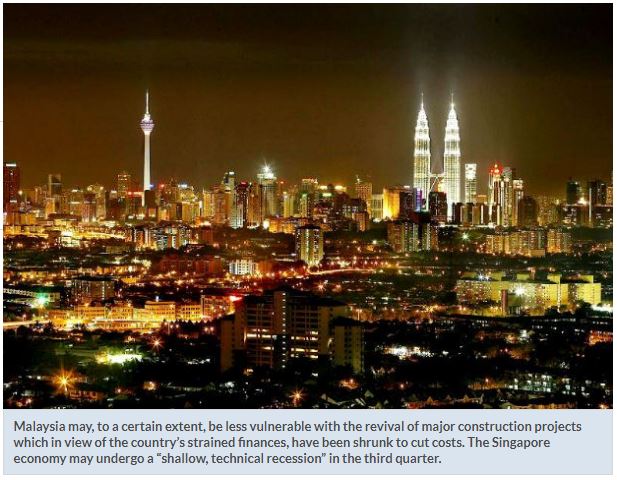Recession fears hit Asian region including Singapore
TALK of recession has hit the region, and near home, Maybank Kim Eng Research is flagging that possibility for Singapore in the next quarter.
Export-reliant economies are hard hit by slowing growth and supply chain disruptions caused by the prolonged US-China trade and tech war.
There may be a ceasefire now in the fight between the US and China following talks between President Donald Trump and President Xi Jinping at the Group of 20 Summit in Osaka last Saturday.
Existing US tariffs on Chinese imports still remain; additional tariffs on the remaining US$300 bil worth of Chinese imports, as threatened, will not be imposed for now
However, the new timeline for truce remains elusive; the suspicion is that of a “creeping” imposition of tariffs, as “each truce is followed by new tariffs and then, another truce.”
In December last year, Trump and Xi had struck a truce following which talks broke down in May this year, and tariffs on US$200bil of Chinese imports leaped from 10% to 25%.
Will there be light out of this tunnel, with harder issues involving tech and supremacy not tackled? Smaller economies with the fiscal and monetary space may be able to cushion their economies somewhat from the downdraft on growth.
Malaysia may, to a certain extent, be less vulnerable with the revival of major construction projects which in view of the country’s strained finances, have been shrunk to cut costs.
The Bandar Malaysia and East Coast Rail Link projects to be revived, are now downsized to RM144bil and RM44bil respectively.
Works for the Light Rail Transit (LRT) 3, from Bandar Utama in Petaling Jaya to Johan Setia in Klang, will resume in the second half of the year, at a reduced cost of RM16.63bil.
Talks are said to be ongoing to revive the Mass Rapid Transit Line (MRT) 3, or MRT Circle Line round the city centre, at possibly RM22.5bil which is half the original cost.
“The timing (of the revival of these projects) has been very good for Malaysia,’’ said Pong Teng Siew, the head of research at Inter-Pacific Securities. “These projects will go on for several years and positively impact the economy over that period.’’
Domestic spending and activities will provide ‘some comfort’ to the local economy but we should ensure that any further monetary easing actually goes into the real economy to support these activities, according to Anthony Dass, head of AmBank Research.
Malaysia’s private consumption was at a record 59.5% of its nominal (calculated at current market prices) Gross Domestic Product, which hit US$88.5 bil in March, 2019, according to CEIC Data.
Benefits from trade diversion from China, the current US tariff hotspot, are offset by downward pressure on global trade where volume was flat in the first quarter, the weakest since the financial crisis.
Global semiconductor sales also declined in February and March, the first back-to-back double digit contraction since the financial crisis.
In view of this decline, the volatile global trade environment and rising geopolitical tensions, open economies “should be prepared for the unexpected,’’ said Nor Zahidi Alias, the associate director of economic research of Malaysian Rating Corp.
The Singapore economy may undergo a “shallow, technical recession” in the third quarter, said Maybank Kim Eng, pointing to possible intensification of supply chain disruptions and US export controls on more Chinese tech firms.
Following the Trump-Xi talks, the US has reversed its equipment sales ban on Huawei but will that ease fears of other similar bans down the road? Defined as two consecutive quarters of negative quarter-on-quarter growth, a recession will prompt further easing of monetary policy in Singapore.
Manufacturing in Singapore, which accounts for a fifth of the economy, fell 2.4%, with electronics dropping 10.8% in May from a year ago; output is expected to decline again in June.
Hong Kong has also been issued warnings of recession, as its economy experienced the largest contraction since 2011, declining by 0.4% in the first quarter against the previous quarter.
Thailand’s economy grew at its slowest pace in four years, in the first quarter, hitting 2.8% from 3.6% in the same period last year; exports remain weak.
Taiwan’s economy avoided contraction in the first quarter but private consumption and gross capital formation slowed significantly while government consumption declined.
In the US, a mis-calibration in interest rate policy by the Federal Reserve can cause a sharper slowdown than expected or bring on a recession.“Monetary policy affects the economy with unpredictable lags, it could be hard for the Fed to time its policy (rate cut) that can prevent a downturn this and next year,’’ said Lee Heng Guie, the executive director of Socio Economic Research Center.
Columnist Yap Leng Kuen notes the reminder to ‘expect the unexpected.’
Source: https://www.thestar.com.my/business/business-news/2019/07/01/recession-fears-hit-asian-region/#CMcocHRpO4vQklEH.99


 Thailand
Thailand




